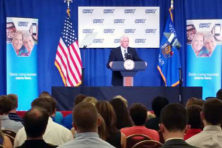State News: Foxconn, Workers’ Comp, Wolves
- Share
- Tweet
- Pin
- Share
Mount Pleasant Tapped for Foxconn Site
Taiwanese tech manufacturer Foxconn has selected a site in the village of Mount Pleasant for its massive new manufacturing facility in Wisconsin. Representatives from the electronics manufacturer joined state and local officials for the announcement in Sturtevant on Wednesday morning.
“We’re looking for partnership, I think that’s where the real excitement is,” said Louis Woo, special assistant and chairman and CEO of Foxconn.
The nearly 1,200-acre campus will be located off Interstate 94 between Braun Road and Highway KR. Foxconn will invest an estimated $10 billion in the facility and is projected to hire up to 13,000 workers.
The state Legislature approved a $3 billion incentives package for the manufacturer last month. The package includes tax credits for construction and job creation, as well as allowances for Foxconn to bypass some state environmental regulations.
Local officials lauded the deal as a game changer for the village of Mount Pleasant and surrounding communities.
“This is a turning point in the history of Racine County, no doubt,” said Racine County executive Jonathan Delvagrave.
Jenny Trick, executive director of the Racine County Economic Development Corp., confirmed all of the land designated for the 20 million square foot manufacturing facility has been acquired from local landowners, and that the average payment was $50,000 per acre.
Trick said construction is projected to begin on the facility by next spring.
The next step for the project is approval of the final contract with Foxconn by the Wisconsin Economic Development Corp.
Seven Counties Designated Disaster Areas Due to Crop Losses
U.S. Department of Agriculture Secretary Sonny Perdue designated Calumet County and six other counties as disaster areas due to crop losses. Heavy rains in late spring and early summer cut Calumet County’s strawberry crops by more than 30 percent. Tom Schneider, the USDA’s County Executive Director for Manitowoc and Calumet counties, said any farmer, regardless of crop, who suffered losses of at least 30 percent is eligible for low interest emergency loans. The emergency loans are meant to help farmers make ends meet until the next harvest. Schneider said the loans have a 3.75 percent interest rate and that there’s no limit on how many the government will fund, as long as applicants meet the requirements. Counties covered by the disaster loan program include: Brown; Calumet; Fond Du Lac; Manitowoc; Outagamie; Sheboygan; and Winnebago.
Medical Society Opposes Proposed Workers’ Comp Changes
Business and medical interest groups are clashing over a proposal to change the workers’ compensation system in Wisconsin. Workers’ compensation covers employees who are injured on the job. Under the proposed change, the state would create a list of set prices for workers’ compensation medical procedures. Forty-four states have those lists, which are called “fee schedules.” The prices in Wisconsin would be based on average prices negotiated by group health plans in the state. Wisconsin Manufacturers and Commerce is pushing for the policy change. The Wisconsin Medical Society opposes the change. They say lower prices can be negotiated without having to create the new list of set prices. The proposal was scheduled to be voted on this week by the Worker’s Compensation Advisory Council. If approved, it will be sent to lawmakers for introduction as a bill. A similar proposal was introduced during the 2013-2014 legislative session, but never made it to the full Assembly or Senate for votes.
Red Cliff Tribe to Trap, Collar Wolves
The Red Cliff Band of Lake Superior Chippewa received a $75,000 grant from the Bureau of Indian Affairs to help the tribe track wolves. Jeremy St. Arnold, tribal wildlife and forestry biologist, said the money will pay for traps and satellite collars to pinpoint wolf movements. “We’re curious if they harass farms, if they harass bear dogs and things like that,” he said. “We’re trying to mitigate conflict and learn as much about these packs as we can.” The tribe plans to collar two packs this fall and expand wolf-tracking as more funding becomes available. There are at least six wolf packs around the Red Cliff reservation. The collars will relay the location of wolves every 25 minutes versus once a week, which is how often the tribe has been obtaining data from the Wisconsin Department of Natural Resources. The DNR does weekly flyovers to obtain information on all collared wolves in the state. St. Arnold said the information will be used to learn more about the packs’ prey and behavior over the life of the collars, which span two to three years. The Red Cliff biologist said they hope to better understand wolves moving through the reservation, timber harvests and the Apostle Islands National Lakeshore. “Wolves are a very important species to the tribe. The tribe looks at the wolf as their brother,” he said. “It’s just a very polarizing animal, and I like to – from my angle – to show people that wolves are actually going to help us rather than hinder us from anything.”
UW-Milwaukee Scientists Helped Black Hole Research
Scientists at the University of Wisconsin-Milwaukee say they’re excited about this year’s Nobel Prize in physics being awarded Tuesday to two researchers from California, Barry Barish and Kip S. Thorne, and Massachusetts scientist Rainer Weiss. The Milwaukee campus helped the award-winners with a major breakthrough. That breakthrough was the observation in 2015 of gravitational waves, caused by the collision of two black holes, about a billion years ago. UW-Milwaukee physics professor Patrick Brady led a local team that figured out how and what to look for, in the data collected by two giant observatories known as Laser Interferometer Gravitational-Wave Observatory, or LIGO. Brady said he’s proud of that role. “The data itself is incredibly noisy. It’s like being in a very big space with a lot of people talking at the same time,” he said. “And, what we have to do is dig out the sound that corresponds to just the type of signal we want.”
Brady said there’s more work ahead, attempting to locate more gravitational waves from the black holes, perhaps weekly. Brady will give a lecture, “When Black Holes Collide: Gravitational Waves and the Discovery of the Century,” Friday evening on the UW-Milwaukee campus. He’s also expected to talk about the Nobel Prize.
Wisconsin Public Radio, © Copyright 2017, Board of Regents of the University of Wisconsin System and Wisconsin Educational Communications Board.


